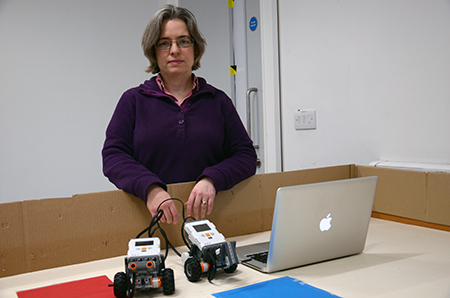Dr Louise Dennis developed the robots as a research tool, before interest from NASA
A system that imitates navigation of a space rover, originally intended for use in North West schools, will become part of NASA’s International Space Apps Challenge later this month.
Dr Louise Dennis, from the University of Liverpool’s Department of Computer Science, designed a programme that allows users to configure commands for a Lego Rover robot based on whether the machine is on the moon, Mars or in the same room.
Artificial intelligence
Dr Dennis said: “We originally developed the robot as a research tool to investigate issues around artificial intelligence, but at the same time we were quite interested in producing some sort of activity that could be taken into schools.
“If you are controlling a planetary rover from Earth, you have to deal with the time delay. Our system allows the children to experiment with driving the rover when there is a time delay and see how that affects behaviour.”
The Lego Rover was taken into schools in Manchester and proved popular, but when teachers asked if there was software available that would allow them to run their own model Lego Rovers in a similar way, Dr Dennis was unable to offer anything accessible.
She said: “We realised it was going to be very difficult for someone without a lot of expertise to install the programme, because it was built on top of a big base of research software.”
The system was originally developed as part of a series of EPSRC funded projects by the University’s Centre for Autonomous Systems Technology, before being identified as a potential STEM activity in schools.
The two Lego Rover robots can be programmed to respond as if they were on the moon, or Mars
The challenge of creating more accessible operating software was submitted to Exeter Hackathon and subsequently picked up by NASA as one of the organisation’s global challenges.
The NASA International Space Apps Challenge focuses on space exploration and runs over 48 hours in 75 cities across the globe, from Abu Dhabi to Adelaide, New York City to Ho Chi Minh City. It aims to create open source solutions to a selection of problems through the combined effort of enthusiasts and experts based around the world.
User interface
Dr Dennis, a Research Associate currently working on a major EPSRC funded reconfigurable autonomy project alongside industrial partners like BAE Systems and Network Rail, said: “It would be really nice to have something that, once it has been taken into schools, they can take and play with themselves. It would also be great to have some people get at the user interface design.”
The NASA International Space Apps Challenge takes place over April 20 – 21, and includes 23 NASA challenges and 25 non-NASA challenges, of which Dr Dennis’ Lego Robots Challenge is one.
She added: “It’s a bit circular because the programme code we started out with was based on code NASA produced so to come full circle and be taking it back to NASA again is very exciting.”
